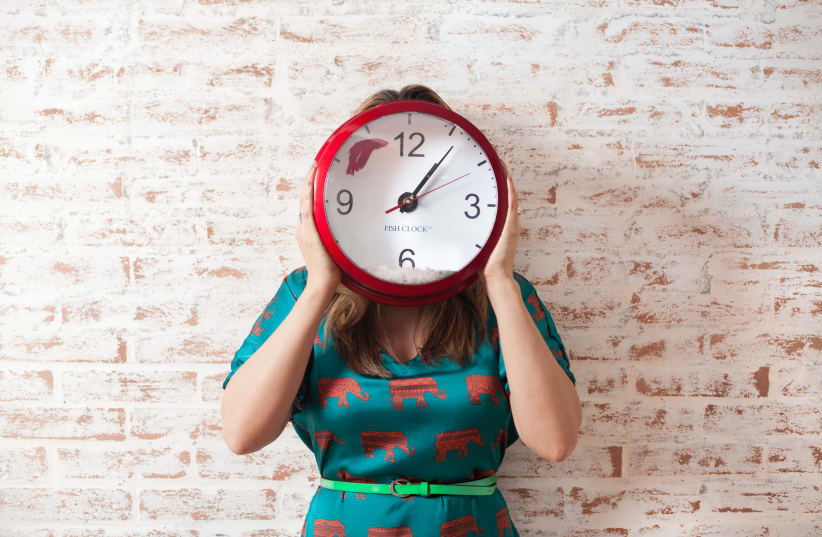Daylight savings time is approaching, and it’s affecting the biological clock ticking in our bodies. This is how this transition will affect your sleep, and also how to prepare for a smoother transition.
What is the role of our biological clock?
Every year, on the last weekend of March, Thursday night comes and we suddenly switch to daylight savings time. In this transition, we lose an hour of sleep but gain another hour of light from the next evening until we “fall back” in October. In contrast to the transition to winter time, which might depress some people, the spring transition produces an optimistic feeling for many.
But such a transition, like any transition and change in life, doesn’t always go smoothly and requires a period of adjustment. The transition can be easier with the help of a deeper understanding of our biological clock and the rhythms which characterize the human body.
Every person has a biological clock that serves as a regulated and timed mechanism of a significant part of the body's functioning throughout the day, through determining the rate of hormone secretions that affect biochemical, physiological and mental processes. The biological clock coincides with the cycles of the day, and is affected by changes between light and darkness. The longer the cycle of the biological clock matches daytime, the better we function.
Modern life is often cut off from nature. We live in closed, air-conditioned rooms and aren’t really connected to the seasons and daylight hours. Despite this, the internal rhythms of the biological clock are synchronized with day and night – light and darkness – and the body will secrete melatonin, the hormone which facilitates sleep when darkness comes. This secretion will intensify later to allow for better and deeper sleep. Our internal biological clock is a very complex mechanism that synchronizes various bodily functions at once which we don’t feel like hormone secretion, blood pressure regulation, heart rate fluctuation, etc.
Our current lifestyle based on artificial lighting and living in enclosed spaces most of the day may disrupt biological clock function. When this happens, we may see a significant increase in traffic accidents, disease outbreaks, an increased risk of hyperactivity, sleep disturbances and even behavioral changes like a tendency to argue and outbursts of anger.
Daylight savings time: How to connect our inner clock to the current time
The best way to achieve balance and prevent disease is to live a healthy lifestyle. One component of this lifestyle is adopting a day and night rhythm: good sleep at night and waking during the day. It’s recommended to make sure that the bedroom doesn’t have LED lighting as this deceives the human eye, causes premature aging of the retina and inhibits melatonin secretion. You should also avoid screens an hour or two before bed and ensure sufficient hours of sleep depending on your age and health status.
Recommended sleeping hours:
- For babies and children up to the age of 5, it’s recommended that they sleep 11 hours a night and nap an hour and a half during the day.
- Children aged 5-11 should sleep 10-11 hours
- Have kids aged 12-14 sleep 9-10 hours
- Teens 14-18: 8.5-9.5 hours
- Adults are advised to sleep between 7 and 9 hours.
People who work at night and sleep during the day should seek treatment to help the body cope with the stress which causes significant damage to the body’s natural rhythm. Today there are a variety of complementary medicine treatments that can help with this: touch therapies (massage, reflexology, shiatsu etc.), acupuncture, biofeedback naturopathy, etc. The role of all of these is to facilitate relaxation and help better sleep.
How to prepare for the transition to daylight savings time
There is no single action that can help with this, as it isn’t a change of consciousness but an internal and uncontrollable mechanism. What do you do? Perform actions that mimic darkness earlier and create a calmer and more inviting sleeping environment.
Take for example a child up to the age of 5 who needs to sleep for at least 11 hours. If parents want their kids to go to sleep but the sun is still shining, you can create a relaxing atmosphere in the house to induce sleepiness. Darken the house, shut off all screens, create a relaxed atmosphere, serve dinner earlier, and establish nightly rituals: a calm bath, stories and songs.
For kids who have more difficulty than others, seek out complementary therapies whose main goal is to create an inner calm in children. Contact therapies will usually be the preferred option, with alternative practitioners sometimes offering to combine homeopathic treatment or give Chinese medicine treatments like shonishin i.e.acupuncture without needles, specifically for kids.
Dr. Moti Levy is the chief physician of Clalit health fund complementary medicine.

